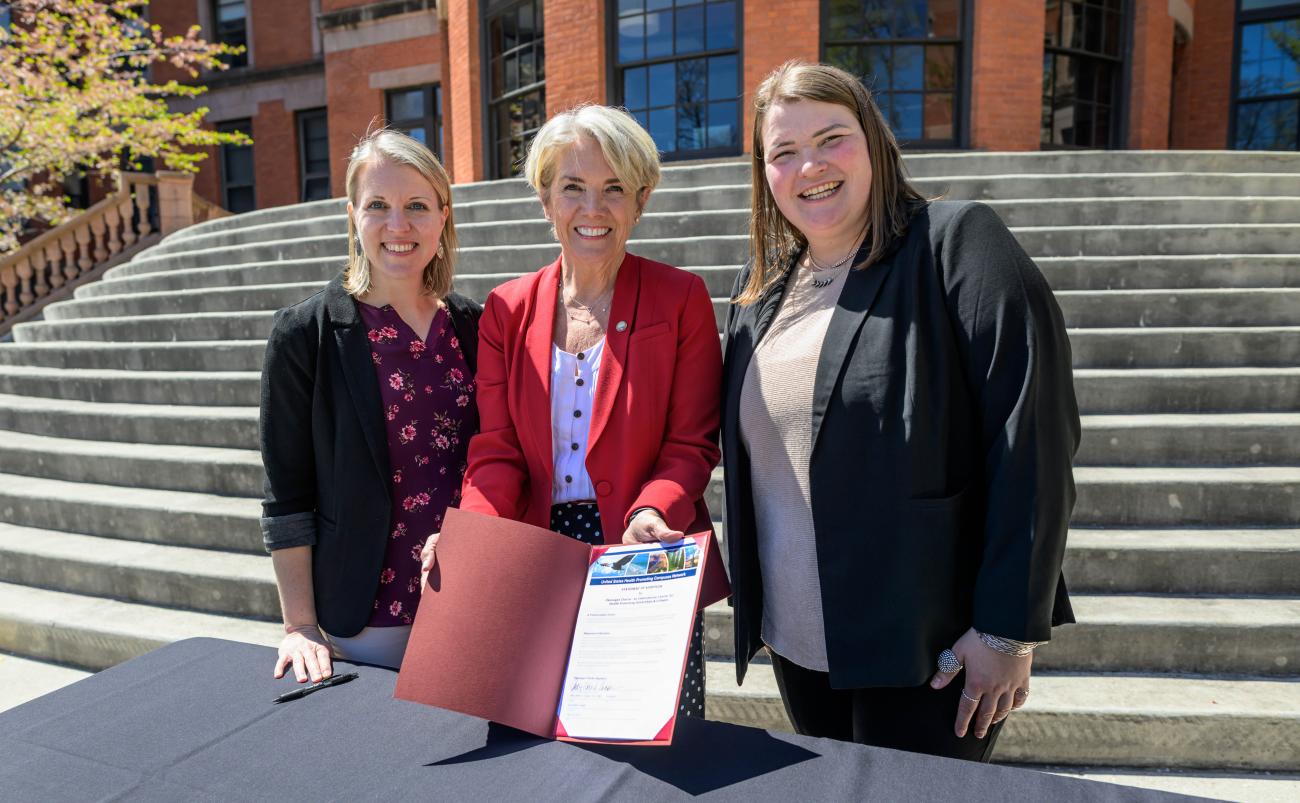Springfield College Adopts Okanagan Charter Becoming a U.S. Health Promoting Campus

At left, Director of Health Promotion Christine T. Johnston, President Mary-Beth A. Cooper, PhD, DM, and Director of The Wellness Institute Devan Musa, G'20.
By: Damon Markiewicz
Springfield College has joined an elite group of 25 higher education institutions throughout the country that have adopted the Okanagan Charter, and as a result, Springfield College is recognized by the United States Health Promoting Campuses Network (USHPCN) as a “health promoting campus.” This commitment of prioritizing health and wellness into all aspects of campus culture, and leading health promotion action into the surrounding communities, has been at the root of the Springfield College mission dating back to 1885.
“Since our inception, Springfield College has prioritized the physical health and wellness of our students, faculty, and staff, while also being proactive in focusing on the significance of mental, emotional, and social well-being,” said Springfield College President Mary-Beth A. Cooper, PhD, DM, who officially signed the charter at an on-campus event April 23, 2024. “Adopting this charter is a way to honor our commitment to being a health promoting campus and enriching a culture of empowerment, resilience, and inclusivity for a thriving and vibrant campus environment.”
Building on the College’s foundation of maintaining a healthy balance of nourishing the spirit, expanding the mind, and exercising the body, Springfield College is now part of an international community that aspires to transform the health and sustainability of current and future societies, strengthen communities, and contribute to the well-being of people, places and the planet.
Jocelyn Bravo, recently elected president for the Class of 2026, explained, “We as students will continue to promote action and collaboration with the campus community, as an effort to continue to prioritize the health and wellness of each other. We continue to look forward to all of the new initiatives this charter will bring to our campus.”
In recent years, Springfield College has introduced new initiatives such as the creation of The Wellness Institute, the formation of an Office of Health Promotion, and the development of several new academic degree and certificate programs related to health and wellness that are being taught inside the new, state-of-the-art, Health Sciences Center.
Led by Director of Health Promotion Christine T. Johnston, the Office of Health Promotion strives to assist students in developing a healthy lifestyle and promotes a campus environment that is conducive to the adoption of healthy lifestyle choices that lead to the academic and personal success of all students.
Director of The Wellness Institute Devan Musa, G’20, leads a holistic approach to health and wellness on campus, one that guides individuals toward optimal well-being through a holistic and solution-focused approach in the areas of movement, nutrition, mindset, and restoration.
“A special thank you to Christine (Johnston) and Devan (Musa) for all of their hard work in making this signing such a special day on campus,” said Springfield College School of Health Sciences Dean Brooke Hallowell, PhD. “They were both instrumental in making the signing of this charter a reality, and they deserve so much credit for their commitment to health and wellness on our campus.”
Springfield College School of Physical Education, Performance, and Sport Leadership Dean Sue Guyer, DPE’03, concluded, “A healthy environment for us all, is really the framework for everyone to be successful in this journey. While the signing of the charter is symbolic, may we all strive to put the values into practice.”
The USHPCN is guided by the Okanagan Charter: An International Charter for Health Promoting University and Colleges, which calls on higher education institutions to embed health into all aspects of campus culture and to lead health-promotion action and collaboration locally and globally. Created in June 2015, the charter provides institutions with a common vision, language, principles, and calls to action to become health-and well-being-promoting campuses.
About the Okanagan Charter
The Okanagan Charter is a guiding and aspirational document that was developed as an outcome of the 2015 International Conference on Health Promoting Universities and Colleges. Health promotion scholars and professionals from around the world gathered to create this document. Its purpose is to guide colleges and universities, using their unique positions and roles in research, teaching and service to their communities, to be leaders for the world in developing and modeling health-promoting strategies in their campus settings. Local communities could then learn from their example and modeling, thus influencing global health and wellbeing strategy. The key is moving beyond traditional approaches of influencing individual behavior, and moving upstream to systems level and environmental strategies that influence the health and wellbeing of person, place and planet.
About the U.S. Health Promoting Campuses Network
Initiated on January 15th, 2020, the purpose of the U.S. Health Promoting Campuses Network (USHPCN) is to facilitate, advance, and promote the adoption of the Okanagan Charter: An International Charter for Health Promoting Universities & Colleges for U.S. Colleges and Universities. The adoption of the Okanagan Charter as an aspirational document represents the beginning of an aspirational journey toward campus wellbeing utilizing a comprehensive settings and systems-level approach. The USHPCN is a support network that helps campuses define, develop, and create strategies and metrics that help define what it means to be a health promoting campus, recognizing that it will be different for each campus based on their unique circumstances, resources, and needs. There are currently 253 members of the network. Each member campus appoints liaisons who meet regularly to learn from, collaborate with, and support each other in this work by sharing resources, best practices, and lessons learned. The USHPCN also collaborates with international networks and is one of thirteen member networks within a more extensive international network, the International Health Promoting Universities & Colleges Network.

